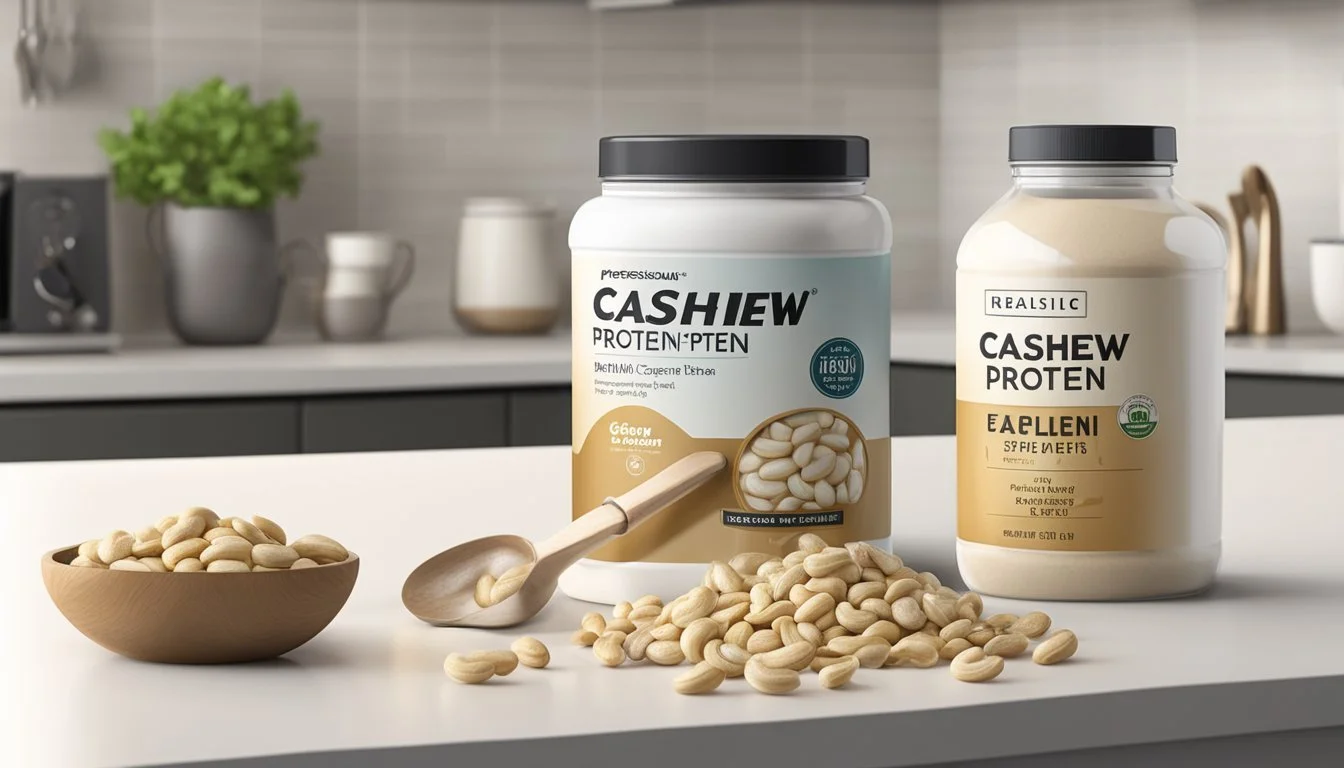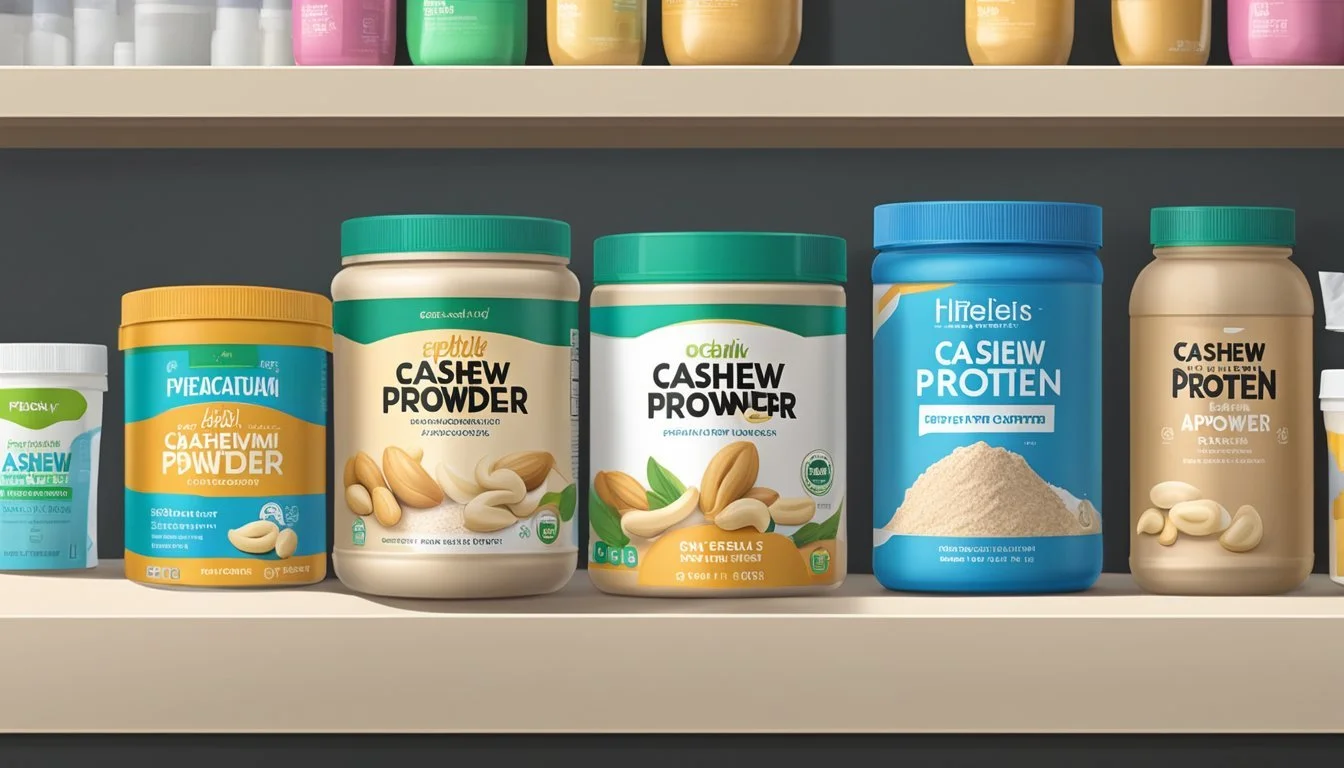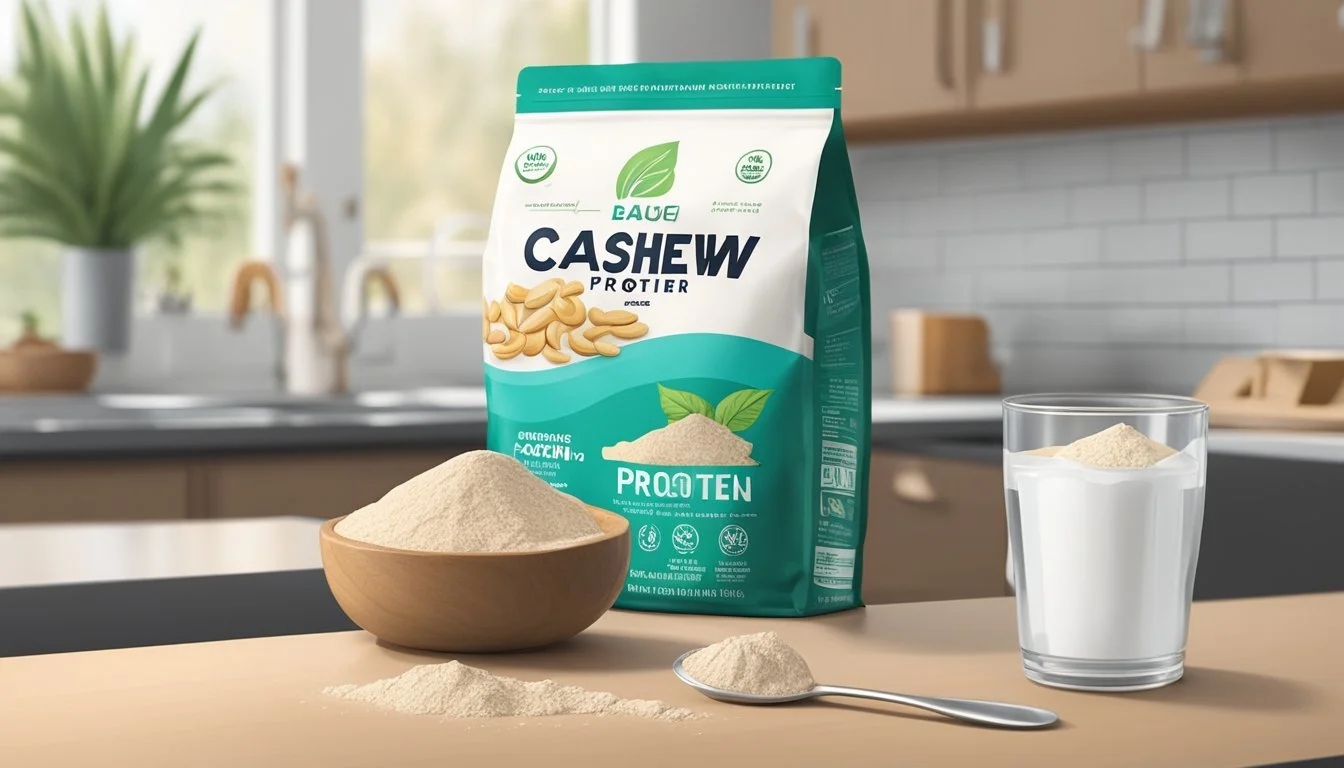Does Cashew Protein Expire?
Essential Shelf Life Facts
When it comes to health and nutrition, understanding the longevity of cashew protein is crucial. Cashews, known for their rich protein content, are a popular choice for those seeking plant-based nutrition. Like many foods, cashew protein does expire, and its shelf life depends heavily on how well it is stored.
Properly sealed and stored cashews can last up to 12 months in a pantry. Once a package is opened, roasted cashews usually remain good for 2 to 3 months if kept in a cool, dry place. This makes cashew protein a reliable source of nutrition, as long as basic storage guidelines are followed.
Cashew protein powder, similar to protein powders derived from other sources, has a finite shelf life due to the ingredients and additives it contains. Ensuring freshness by checking expiration dates and adhering to storage recommendations is essential for maintaining its nutritional benefits. This will keep your protein intake both safe and effective.
Understanding Protein Powder
Protein powder is a popular supplement among athletes, fitness enthusiasts, and individuals looking to increase their protein intake.
Protein Types and Sources
Protein powders come from various sources, each with unique qualities. Common types include whey, casein, soy, pea, rice, and collagen. Whey protein is highly favored for its complete amino acid profile and quick digestion. Casein digests slowly, making it ideal for sustained protein release. Soy protein is a plant-based option with a balanced amino acid profile. Pea protein is hypoallergenic and easy to digest, while rice protein is great for those with allergies. Collagen protein focuses on joint and skin health rather than muscle building.
Nutritional Profile
The nutritional profile of protein powders varies by type and brand. A typical serving of protein powder might contain around 20-30 grams of protein, minimal fats, and carbohydrates. Whey and casein proteins usually offer all essential amino acids. Plant-based proteins like soy, pea, and rice can be combined to achieve a complete amino acid profile. Some powders include added vitamins, minerals, and even probiotics for additional health benefits. Collagen powder is unique in its high glycine content, beneficial for skin, hair, and joints.
Role in Health and Diet
Protein powders play a significant role in supporting diverse health goals. For athletes and bodybuilders, they aid in muscle recovery and growth. For dieters, protein helps with satiety and weight management. They are also beneficial for anyone looking to meet daily protein requirements, especially vegans who might struggle to get adequate protein from food alone. Moreover, protein is vital for muscle repair, immune function, and overall energy levels. Collagen protein supports joint health and skin elasticity, making it popular beyond traditional fitness circles.
Popular Protein Powder Variants
Among the popular variants, whey protein stands out for its quick absorption and complete amino acid profile, ideal for post-workout recovery. Casein protein, with its slower absorption rate, is preferred for nighttime use. Soy protein is a versatile plant-based protein rich in essential amino acids. Pea protein, known for being allergy-friendly, is often used in vegan formulations. Rice protein is another hypoallergenic option that offers moderate protein content. Lastly, collagen protein is valued for its benefits to skin and joint health rather than muscle building.
The diversity in sources and benefits makes protein powders a flexible and valuable supplement for various health and dietary needs.
Factors Affecting Protein Powder Shelf Life
Protein powder shelf life depends on various factors like storage conditions, packaging, and moisture control. These factors play a crucial role in maintaining the quality and safety of the product.
The Impact of Storage Conditions
Proper storage can significantly extend the shelf life of protein powders. Ideally, protein powders should be kept in a cool, dry place away from direct sunlight. Exposure to heat accelerates the degradation of the proteins and other ingredients, which reduces the product's effectiveness.
Moisture and humidity are also critical. Even small amounts of moisture can cause clumping and spoilage. As such, keeping the protein powder in an airtight container in a dry environment is essential.
Role of Packaging
Packaging plays a pivotal role in preserving protein powder shelf life. High-quality packaging materials that provide a barrier against air and moisture are ideal.
Materials like foil or multi-layered plastic can effectively block out oxygen, which helps prevent the powder from oxidizing. Some manufacturers also include desiccant packets in the packaging to absorb any residual moisture. Additives such as lecithin and maltodextrin may also be used to improve mixability and stability, indirectly contributing to longer shelf life.
Importance of Moisture Control
Moisture control is crucial for maintaining protein powder quality. When protein powders are exposed to moisture, they can clump or develop mold, rendering them unsafe to consume. Manufacturers often incorporate silica gel packets to help control the moisture inside the container.
Consumers should ensure the lid is tightly sealed after each use to prevent moisture ingress. If the protein powder appears damp or clumpy, it’s advisable to discard it as it may no longer be safe to consume.
Identifying Signs of Expiration
Knowing when cashew protein has expired ensures safety and maintains quality. Key indicators include changes in color, texture, smell, flavor, and the presence of mold or clumps.
Changes in Color and Texture
Expired cashew protein often shows noticeable changes in color and texture. Fresh cashew protein typically has a smooth and consistent texture with a pale, creamy color.
Over time, exposure to air and moisture can cause the color to darken or become uneven. The texture may also change, becoming clumpy or grainy. These visual and tactile changes are important signs that the product may be past its prime and should be discarded.
Noticing Off Smells and Flavors
The smell is a primary indicator of expired cashew protein. Fresh cashew protein should have a mild, nutty aroma.
As it ages, the fats within cashew protein can break down and oxidize, leading to a rancid smell. This rancid odor is a clear sign that the protein has spoiled. Performing a sniff test can help detect off smells, which may also be accompanied by an unpleasant or bitter taste during consumption.
Detecting Mold and Clumping
Mold growth is a serious sign that cashew protein has expired. Mold can appear as dark spots and indicate that harmful bacteria may be present.
Clumping can occur if the protein has been exposed to moisture. Clumps often form when the product absorbs humidity, which compromises its quality. The presence of mold or clumping warns that the cashew protein is no longer safe to use and should be discarded immediately to avoid potential health risks.
Health Risks and Safety Considerations
Expired cashews pose several health risks, primarily related to bacterial growth and spoilage. Following guidelines from nutritionists can help ensure safety when consuming these nuts.
Potential for Bacterial Growth
Bacterial contamination in expired cashews can lead to serious health issues. Salmonella and E. coli are common culprits. Symptoms of infection include nausea, vomiting, and diarrhea.
Cashews stored in environments with high humidity and temperature are particularly vulnerable. Improper storage can accelerate bacterial growth. To reduce risk, cashews should be kept in sealed containers in cool, dry places.
FDA guidelines emphasize maintaining proper hygiene during storage to prevent bacterial contamination.
Understanding Spoilage and Food Safety
Spoilage in cashews is often due to fat breakdown, leading to rancidity. Rancid cashews have an unpleasant taste, smell, and texture. Consuming rancid nuts can result in digestive discomfort or more severe symptoms like stomach cramps.
Spoiled cashews may appear discolored or shriveled and could have mold growth. Aflatoxin, a toxin produced by mold, is particularly dangerous and can cause severe health problems.
To ensure food safety, it's crucial to check for signs of spoilage before consumption and store cashews in airtight containers away from heat and moisture.
Guidelines from Nutritionists
Nutritionists recommend storing cashews in the refrigerator or freezer to extend their shelf life. Proper storage practices are essential to maintaining the nuts' nutritional value and safety.
Shelf Life:
Pantry: Up to 6 months
Refrigerator: Up to 1 year
They also advise against consuming cashews past their expiration date if there's any doubt about their condition. Using the "sniff test" and checking for mold are simple yet effective methods for assessing freshness.
It's important to follow these guidelines for optimal safety and health benefits.
Maximizing Protein Powder Lifespan
To extend the lifespan of your cashew protein powder, focus on proper storage and the role of additives. These factors significantly impact the quality and shelf life of your supplement.
Best Practices for Storage
Storing cashew protein powder in an air-tight container is essential to keep it fresh. Exposure to air can lead to the oxidation of ingredients, reducing the protein's effectiveness over time.
Temperature also plays a role. Keep the container in a cool, dry place, away from direct sunlight. Fluctuations in temperature can cause condensation inside the container, promoting mold growth and degradation of the protein.
Humidity is another consideration. High moisture levels can trigger the Maillard browning reaction, which affects the taste and nutritional value of the protein powder.
Recognizing the Role of Additives
Additives can preserve the quality of cashew protein powder. Common preservatives like ascorbic acid and citric acid help prevent spoilage.
Strengthening protein powder with natural antioxidants like vitamin E can extend its shelf life. These antioxidants combat oxidation, which deteriorates the protein's quality.
Fillers and artificial flavors might be included to enhance taste and texture but can negatively impact the longevity of the product. Evaluating the ingredient list helps in understanding how additives affect the shelf life.
Understanding the additives and their functions ensures that users can enjoy cashew protein powder at its peak quality. Awareness of the role these components play will help in making informed choices regarding product selection and usage.
Nutritional Efficacy Over Time
Cashews contain significant nutrients, including vital protein content and essential vitamins and minerals. Over time, these nutrients can degrade, altering their nutritional efficacy.
Protein Content Stability
The protein content in cashews remains relatively stable if stored properly. Cashew proteins are mostly globulins and albumins, which can withstand moderate temperature variations but may suffer from exposure to high heat or extreme moisture.
To ensure protein stability, proper storage in a cool, dry place is critical. Cashews should be kept in airtight containers to minimize oxidation and prevent rancidity. When significant protein degradation occurs, it is usually due to improper storage conditions rather than just the passage of time.
Preservation of Vitamins and Minerals
Cashews are a rich source of vitamins such as B6, K, and E, as well as vital minerals like magnesium, phosphorus, and zinc. These nutrients can degrade over time, especially under suboptimal storage conditions.
Vitamins, especially B vitamins, are sensitive to light, air, and heat. Minimizing exposure to these elements can help preserve their efficacy. Similarly, minerals may also leach out or degrade when cashews are exposed to moisture. Proper sealing and refrigeration can extend the nutrient lifespan significantly.
Amino Acid Integrity
Lysine, an essential amino acid found in cashews, plays a crucial role in protein synthesis and overall health. Over time, the integrity of amino acids can be compromised due to improper storage conditions, including exposure to air and moisture.
Amino acids are generally more stable than vitamins but can still deteriorate, leading to reduced nutritional value. Ensuring cashews are stored at optimal temperatures and protecting them from humidity and light are key strategies to maintain amino acid integrity and ensure the highest possible nutritional efficacy.
Practical Tips for Consumers
Understanding how to handle and store cashew protein supplements is essential for maintaining their quality and effectiveness. Consumers should pay attention to expiration dates and consider their lifestyle and usage patterns to optimize their benefits.
Decoding Expiration Dates
Expiration dates on cashew protein supplements indicate the period during which the product is expected to remain at its peak quality.
Even after the expiration date, the product might still be safe to consume, but its protein synthesis efficiency might decline.
Signs of spoilage include changes in smell, taste, or texture.
Storage conditions: Keep cashew protein in a cool, dry place, away from direct sunlight to extend its shelf life.
Airtight containers can help prevent exposure to moisture and contaminants.
Considering Lifestyle and Usage
Weight management goals can influence how frequently one uses cashew protein supplements.
An active lifestyle that involves regular exercise may require more frequent use to support muscle recovery and protein synthesis.
Balance your protein intake with other nutritional needs to avoid excess consumption.
Track consumption patterns to ensure that the product is used within its effective period, maximizing its benefits.
Proper storage can help maintain the quality of cashew protein supplements, fitting neatly into various lifestyles and usage scenarios.







